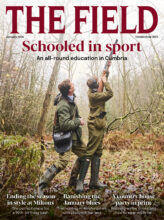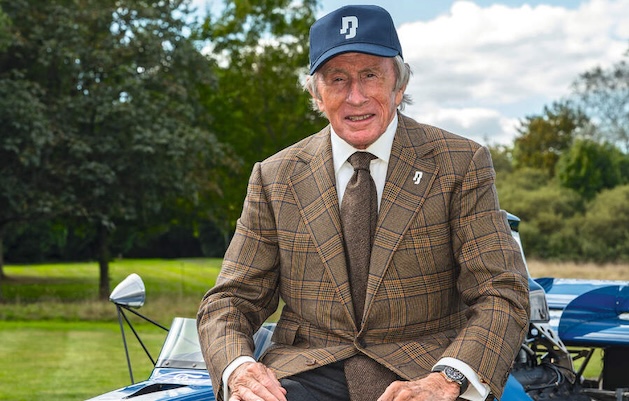The F1 legend is famous for his triumphs on the track but, as he tells Charlotte Mackaness, it was shooting that first changed his life, setting him on a path to help others change theirs
Given his reputation for humility, it comes as little surprise that three-time Formula One (F1) world champion Sir Jackie Stewart happily credits a long line of others for his success. What may raise an eyebrow, however, is the importance this energetic octogenarian sporting legend places on shooting. “It made my life,” he declares. “I went from suffering nothing but embarrassment and frustration as a young man to something wonderful.
“School was an utter disaster for me. I am an extreme dyslexic and can still barely read and write but it wasn’t diagnosed for decades,” Stewart explains. “I was told I was a ‘dummy’ in front of everyone and removed from the Dumbarton Academy because I couldn’t keep up. That sort of thing can be very damaging for a person,” he says softly. “When I was about 14 my father suggested I had a go at clay pigeon shooting and that was when things started to change.”
Fieldsports engrained in DNA
Stewart’s father ran a garage but he was the son of a gamekeeper and a keen shot himself, so both motorsports and fieldsports are ingrained in the family DNA. Having shown an uncanny natural aptitude, soon after ‘young Jackie’ was entered in a local competition. “I won it,” he says, eyes sparkling. “I beat a group of adults but it was on New Year’s Day, so I expect that was down to the whisky consumed. Here was wee Jackie, clean as a whistle, with this enormous trophy.”
And the winning ways continued. Stewart travelled across the country, eventually becoming British champion and narrowly missing Olympic selection. “This was huge for me because I’d been such a failure at school. Suddenly I was good at something and had something to be proud of. It meant as much to me as winning the F1 World Championship,” he insists.
Sir Jackie Stewart – racing cars
Despite his success, there was no money to be made from shooting but there was from racing cars. As a young mechanic, Stewart had caught the attention of a wealthy client with a collection of cars. “I was given the drive after doing a really good job of repairing them and in time Ken Tyrrell spotted me. I had a test at Silverstone in a Formula 3 (F3) car and beat the F1 car. Never being as ‘clever’ as other people, I’ve always pushed myself to do things as well as I can,” he says in his gentle burr.
“My first F3 race was in Monte Carlo, which I won. Soon after someone came over to congratulate me: Juan Manuel Fangio, the greatest driver of all time in my mind. I was blown away that Fangio would know who I was,” recalls Stewart. Of course, the ‘Flying Scot’ had caught the attention of not simply Fangio: F1 teams were lining up to sign him.
While he may be famous for his triumphs on the track (Sir Lewis Hamilton is the only British driver to have enjoyed greater success), Sir Jackie Stewart is universally admired for his decency and determination; he’s one of life’s good guys. He was a pioneer of motorsport safety, leading a hard-fought campaign to improve tracks and medical facilities, and has applied this same can-do mentality to helping a host of other causes close to his heart. This includes touring prisons in Scotland to talk about dyslexia with inmates, emboldening them to seek help by sharing with them his own struggles reading and writing.
Race Against Dementia
Love for his wife of more than six decades, Lady Helen, is what fuels Stewart’s campaigning today. He founded the charity Race Against Dementia after her diagnosis of frontotemporal dementia and is using all the drive, innovation and problem-solving skills found in F1 to inject speed into the search for a cure. “This all started because Helen was my timekeeper and lap charter,” he explains. “When she married me I was a clay pigeon shooter but she’s gone around the world helping my career.
“It was what all the wives did in those days. Now, there are 60 or 70 people and a bank of computers doing what Helen did. It was a really important job, an art, and I still have all the stopwatches at home,” he says. “Helen has travelled everywhere with me, including all my trips shooting. I have been lucky to have spent time with the late Queen, including some very special shooting invitations to Balmoral, Sandringham and Windsor. However, it would take me hours and hours to pen a thank-you letter to her afterwards. In the end, I explained my difficulties with writing and we agreed I could just speak to her to express my thanks, which I did.”
Stewart has that golden ability to connect with seemingly everyone he interacts with. “The gamekeepers, the loaders, the beaters, the dog handlers – the whole society surrounding shooting is wonderful and such a thing to share together,” he enthuses. “I particularly love watching the dog handlers. I had some wonderful spaniels and labradors in my time but these days I have two cheeky Norfolk terriers: Jack and Jill. “I don’t shoot as much as I used to but I still really enjoy actually being there even if I don’t even if I don’t pick up a gun. In life, it is always important to focus on what we can do rather than what we can’t. That way we find solutions to problems and stay positive,” says Stewart, not just a world champion but a champion of the world. Read further information about Race Against Dementia.





